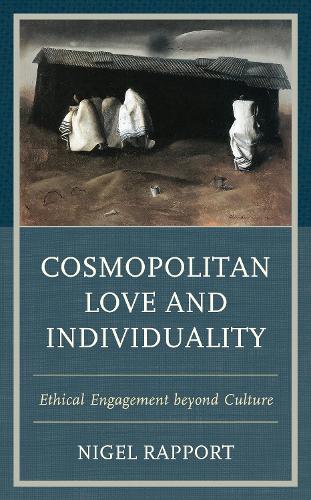
Cosmopolitan Love and Individuality: Ethical Engagement beyond Culture
(Hardback)
Publishing Details
Cosmopolitan Love and Individuality: Ethical Engagement beyond Culture
By (Author) Nigel Rapport
Bloomsbury Publishing PLC
Lexington Books
23rd November 2018
United States
Classifications
Professional and Scholarly
Non Fiction
Philosophy
128.46
Physical Properties
Hardback
274
Width 159mm, Height 230mm, Spine 24mm
608g
Description
Love discovers the reality of individual human beings, wrote Iris Murdoch; love deifies the person, wrote Ralph Waldo Emerson. This book proposes love as a kind of civic virtue: that loving recognition might function as a universal form of ethical engagement and inclusion. Loving recognition is proposed as a civil practice that enshrines the individuality of human identity, overcoming the labels and classes of ethnicity, nationality, religiosity and social status. A particular understanding of love is suggested. Love as civic virtue is described as a complex comprising emotional attraction to a human being, together with discernment of the individual specificity of that human being, and also respect for that specificity: in a loving engagement, the individuality of the other person is let be, given the space to subsist and encouraged to fulfil itself. Who is this beloved other human being It is Anyone. Loving recognition is universalizing. It not only insists on a human species-wide commonality that supervenes upon the ways in which we habitually classify the world according to invented categories (such as peoples supposed belonging to national or ethnic or religious or economic or cultural groups and classes), it also insists on recognizing Anyone, the globally common individual human being, and including Anyone within a universalizing loving practice. This book places its faith in love because of the motivating force that love delivers. Loves emotional engagement is such as to individuate the beloved: in themselves, as themselves and for themselves. The force of love overcomes the habit of seeing the world through a societys and a cultures conventional classificatory lens. Love delivers a kind of epiphany: a moment of vision such that the other human being does not appear as representative of a social category or class but is rightfully appreciated as being in possession of a unique and precious individual life.
Reviews
This is athoughtful and deeply passionate book about the civic virtues of mutualrecognition. Through a series of nuanced reflections on cosmopolitanism,individuality and society, Rapport proposes to consider love as theprinciple virtue necessary for establishing a compassionate space forotherness. As such,Cosmopolitan Love and Individualityis classic Rapport but with a twist. With a novel-like prose, the book eloquently captures the conceptual,political and existentialcomponents of a cosmopolitanism that is anchored inthe distinctive specificity of the Other. Rapport takes this discussion onto anew level, however, by boldlyproposing that an integrative society of equalscan only be formed through the emotional and compassionate engagement of love. -- Morten Nielsen, Denmarks National Museum
Cosmopolitan Love and Individuality is the intellectual successor to Rapports 2012 Anyone, The Cosmopolitan Subject of Anthropology. In it, he rehearses what might be the motivation for taking up his formerly described politesse as general practice and for recognizing its virtue: the loving look. This book has all the hallmarks of Rapports intrepid thinking, chief of which is his dissatisfaction, even anxiety, over the entrapment we anthropologists tend to make of ourselves in classificatory thinking. Having long been one of our bravest thinkers, this book is a quest to loose ourselves from the classifications we all too often take to be realities of culture, challenging us to look beyond our borders, and inviting us to visit with the promise of the loving. -- Simone Dennis, Australian National University
Author Bio
Nigel Rapport is professor of anthropological and philosophical studies at the University of St. Andrews.
